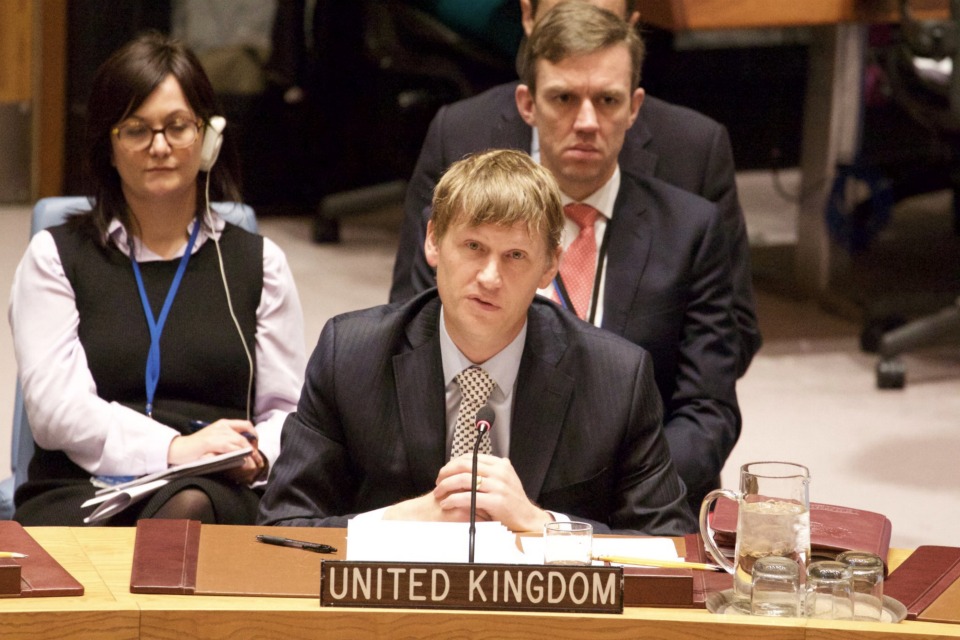Call for Humanitarian Access in Syria
Statement by Ambassador Jonathan Allen, Chargé d’Affaires, at the Security Council Briefing on Syria Humanitarian Issues.

Thank you Mr President, and thank you also to Assistant Secretary General Muller for her briefing.
When considering the Syria humanitarian issue, we always have in mind the powerful plea last December by the Russian Permeant Representative that we should keep our differences over the politics in Syria out of our consideration of humanitarian issues which we strongly continue to agree we should do.
Last week, Mark Lowcock briefed us on his visit to Syria. This was the first time an Under-Secretary-General for Humanitarian Affairs had visited Syria for over two years, having been blocked previously from visiting. The United Kingdom commends the Under-Secretary-General’s efforts to start a meaningful dialogue between the UN and the Syrian regime in order to improve the humanitarian situation for the people of Syria.
On the basis of his discussions, and as reiterated today, the Under-Secretary-General set out five clear asks to enable the UN to sustain and improve its aid efforts. The UK supports those asks fully.
Unfortunately, the Council has been unable to reach agreement on a text which would unanimously call upon the Syrian regime to ensure that these five asks are granted without delay. And I want to reflect on this disappointing situation.
One of OCHA’s five key asks is the Regime’s agreement to allow three or four UN and Syrian Arab Red Crescent convoys each week across front lines to provide assistance to up to 2.5 million people in besieged and hard to reach areas. These convoys are needed to deliver aid, including both food and medical supplies, to civilians who have lived in a war zone for almost seven years.
This request for consistent, regular access to all people in need is crucial. In 2017, only 27% of UN inter-agency convoy requests were approved by the Syrian regime in full. This is significantly worse than in 2016 when 45% of requests were approved. ASG Mueller’s briefing was especially concerning in this respect. We cannot let this happen again in 2018.
94% of those living under siege are located in Eastern Ghouta. The Assad regime is using humanitarian aid as weapon of war by restricting access to the besieged population. There were no aid deliveries to the area for the whole of December, and nearly 12% of children under five in Eastern Ghouta suffer from acute malnutrition. It is appalling that innocent children are once again suffering the most.
The Under-Secretary-General also requested the immediate evacuation of hundreds of people who are medically in need from Eastern Ghouta. We call on those who can influence the regime to use all of their authority to allow for rapid, unhindered and sustained humanitarian access and medical evacuations for those in need. According to the United Nations Secretary-General, 18 people have already died waiting for the regime’s permission to leave the besieged city. People are dying for want of healthcare and services which are available less than ten miles away in Damascus.
Mr President,
Let us recall that the backdrop of the Under-Secretary-General’s visit was the escalation of airstrikes in Eastern Ghouta and the northwest, including Aleppo, Idlib governorates and Northern Hama. Yesterday at least five people, including a child, were killed by an airstrike on a hospital supported by Médecins Sans Frontières in Syria’s Idlib governorate. The facility was also seriously damaged and at least six people, including three medical staff, were injured as a result of the attack. The airstrikes on the hospital occurred while the doctors were receiving people that had been injured an hour earlier in another airstrike on a market. Those strikes had already killed 11 people.
These are in areas where there are meant to be ceasefires with the stated aim of putting a prompt end to violence and improving the humanitarian situation.
Unfortunately for the people of Syria, this could not be further from the reality. The deliberate targeting of civilians and civilian infrastructures in Idlib and Eastern Ghouta continues, in blatant violation of international humanitarian and human rights law.
The intensification of hostilities has displaced approximately 270,000 people within Idlib since 15 December 2017– stretching scarce resources beyond their limits. The escalation of airstrikes in Eastern Ghouta has resulted in hundreds of civilian deaths since 30 December. UNICEF reports that, in the first 14 days of 2018, more than 30 children were killed by escalating violence in the enclave.
It is against this backdrop that I call for the regime to allow for the immediate, safe and unhindered access for humanitarian assistance to meet fully the needs of those who require food and medical supplies. Let all with influence exert it to ensure this. This is our most crucial immediate request. It is also imperative that all parties adhere to agreed ceasefires and cessations of hostilities, uphold international humanitarian law, and protect civilians.
Mr President,
Yesterday, a number of us visited the US National Holocaust Museum’s exhibition on Syria. We saw the photographs of those killed and tortured by the regime and we read their biographies, their life stories. It had a profound effect on me, and it brought home just how the tragedy in Syria is not a geo-political one; it is a human one. For humanity’s sake, all of us round this table must ensure we have done our all.
Thank you Mr President.